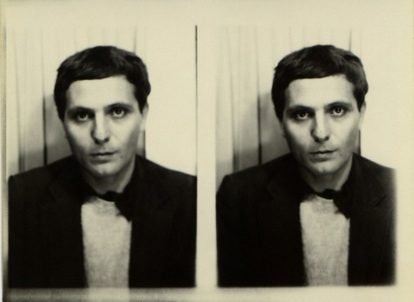Experimental Literature Today
In May 2015, over forty years after its original publication, Philippe Sollers’s ground-breaking novel, H, was published in English for the very first time by Equus Press. As part of Birkbeck's Arts Week that year, Dr David Vichnar and Professor Louis Armand—editors of Prague-based literary magazine VLAK,—visited the college to give a talk on this innovative text, now considered one of the most important literary works of the twentieth century.
As a student of modern and contemporary literature at the time, it was with great intrigue and excitement that I attended and listened to Dr Vichnar and Professor Armand discuss the ways in which H, published in 1973, continues to challenge preconceived notions of literature today. Written as a continuous stream of consciousness with no plotline, characters, or punctuation, H explores the limitations of language, posing a challenge to traditional literary forms as well as to the notion of readability as we know it.
Supporting Roland Barthes’s assertion in his 1967 essay "The Death of the Author," that literary works should be decoded according to the reader’s subjective interpretation as opposed to the author’s intentions or biographic history, H disassociates itself from its author and effortlessly reinvents itself with every new reading. Experimental in all senses of the term, it confidently ignores traditional formal and intellectual expectations, taking us out of our comfort zones and showing us a new way of contemplating literature's merits and purpose.
During the first half of the talk Dr Vichnar relayed Julia Kristeva’s thoughts on H, describing it as a musical text more akin to poetry than prose in form and content. Offering no other way of decoding meaning than through subjective interpretation, H, he told us, recognises each reader as a vital and active part of its own existence. In the words of Sollers himself, “A work exists by itself only potentially, and its actualization (or production) depends on its readings and on the moments at which these readings actively take place.”
In the second half, Professor Armand made a connection between Sollers’s experimental writing style and the rise of the free jazz movement in the mid-twentieth century, delivering his talk to the noodly rhythms of Anthony Braxton’s "For Alto." Where traditionally structured and punctuated novels, like more structured forms of jazz, offer at least some kind of narrative cohesion, H provides nothing more than language and therefore invites the reader to discover for themselves the significance, if any, of each written word.
Clear from the beginning of the talk was the passion felt by both speakers, not only for H, but for the avant-garde in general, as they each conveyed a deep appreciation for the significant role that writers such as Sollers have played in the continuation of experimental literature since Modernism.
Providing fascinating insights into H as a highly creative and influential text, both Dr Vichnar and Professor Armand are to be commended for the depths into which their research delved, and for the enthusiasm with which they communicated their knowledge to the audience. Having gone into the talk with next to no knowledge of Sollers or his work, I am now looking forward to embarking upon my own interpretative journey through H.
Those interested in reading H can purchase a paperback copy directly from Equus Press.
NB: This is an edited version of an event review originally written for Birkbeck Events Blog, which was published under my previous name, Madelaine Bowman, on 1 June 2015.
